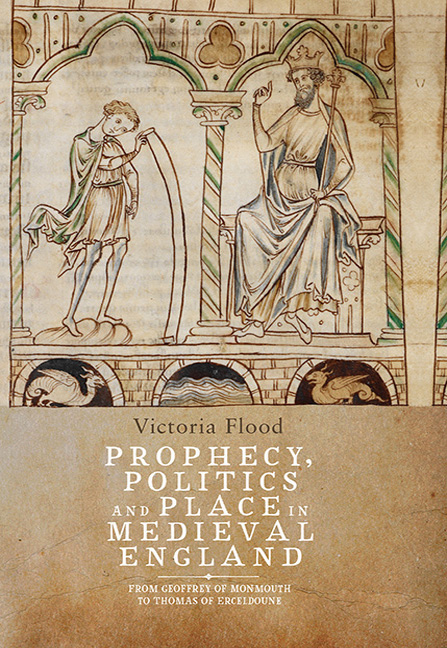Book contents
- Frontmatter
- Dedication
- Contents
- List of Illustrations
- Acknowledgements
- Abbreviations
- Introduction: An Island of the Ocean
- 1 ‘Cadualadrus Conanum uocabit’: Political Prophecy in England, the Welsh March, and Ireland, c. 1130s–1260s
- 2 ‘E si finerount les heirs d'engleterre hors de heritage’: Galfridian Prophecy and the Anglo-Scottish Border, c. 1301–30s
- 3 ‘Whan shal this be?’ The English Erceldoune Tradition, c. 1310s–90s
- 4 ‘A dede man shall make bytwene hem acorde’: Cock in the North and Ceiliog y North, c. 1405–85
- Conclusion
- Bibliography
- Index
2 - ‘E si finerount les heirs d'engleterre hors de heritage’: Galfridian Prophecy and the Anglo-Scottish Border, c. 1301–30s
Published online by Cambridge University Press: 09 May 2017
- Frontmatter
- Dedication
- Contents
- List of Illustrations
- Acknowledgements
- Abbreviations
- Introduction: An Island of the Ocean
- 1 ‘Cadualadrus Conanum uocabit’: Political Prophecy in England, the Welsh March, and Ireland, c. 1130s–1260s
- 2 ‘E si finerount les heirs d'engleterre hors de heritage’: Galfridian Prophecy and the Anglo-Scottish Border, c. 1301–30s
- 3 ‘Whan shal this be?’ The English Erceldoune Tradition, c. 1310s–90s
- 4 ‘A dede man shall make bytwene hem acorde’: Cock in the North and Ceiliog y North, c. 1405–85
- Conclusion
- Bibliography
- Index
Summary
The late thirteenth and early fourteenth centuries saw a new use of the Galfridian vision of insular unity as an expression of English ambitions in Scotland. This movement stands contemporary with the beginnings of the Scottish Wars of Independence. During these years, political prophecies rooted in Galfridian principles, constructing claims to insular overlordship, were composed in northern England and circulated widely. This was in many respects a reaction to the contemporary uses of political prophecy in Scotland, opposed to English expansionism. The exclusivity of the Galfridian concept of Britishness, a vision of a singular people whose rule is rightly pan-insular, made it a powerful piece of political rhetoric on both sides of the border. In Scotland, however, this material depended on an authorising alliance of the Scots with the true Britons, the Welsh, in imaginings of a Scottish-led anti-English confederation. This oppositional construction informed the development of political prophecy on both sides of the Anglo-Scottish border, and entered into a reflexive relationship with high politics, both reacting to and informing political decision-making.
The Anglo-Scottish border of the later Middle Ages has been regarded as a frontier society governed by local feuds and affiliations capable of overriding the sympathies and obligations necessitated by national politics. From this, historians have put forward the concept of a shared system of heroic values common to northern English and southern Scottish communities, envisaging a military society that displayed mutual respect. This vision is essentially at one with the medieval world depicted in the Scottish border ballads of the sixteenth century. However, the Anglo-Scottish border was a space not only of common martial values but the frontline in a conflict zone where national identifications mattered intensely. The rigidity of these were at the very foundation of the production of political prophecy in England and Scotland, and were fundamental to elite ideologies. Of course, this obscured a much more complicated reality. Numerous Scottish dynasties of Norman descent historically held lands on both sides of the border and had at times been subject to both the Scottish and English kings – including contenders for the Scottish throne, the Balliols and the Bruces. Furthermore, significant Norman settlement in Scotland during the previous centuries complicated clear national distinctions, which in the lowlands were impossible to support genealogically or linguistically.
- Type
- Chapter
- Information
- Prophecy, Politics and Place in Medieval EnglandFrom Geoffrey of Monmouth to Thomas of Erceldoune, pp. 66 - 109Publisher: Boydell & BrewerPrint publication year: 2016



